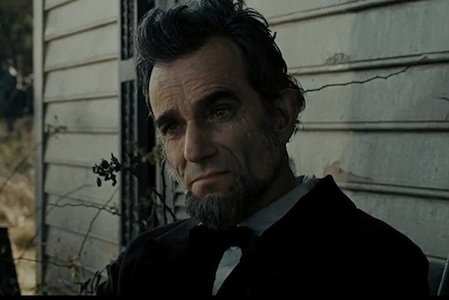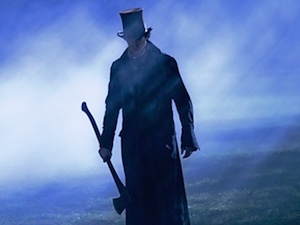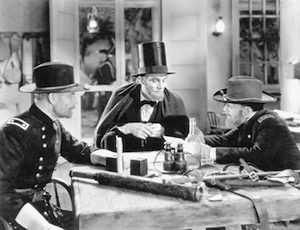
Steven Spielberg’s Lincoln is a high-profile study of one of America’s greatest presidents leading his country through the perilous Civil War. Too bad it doesn’t show him hunting vampires. Spielberg’s movie may be the more historically accurate evocation of the legendary Lincoln, to say the least, but if there’s one thing that Abraham Lincoln: Vampire Hunter shows us, it’s that Lincoln, as icon, transcends historical fact. The Lincoln legend informs our ideals and sparks our imaginations. Lincoln is so familiar to us now; why not have fun with him? The problem with Abraham Lincoln: Vampire Hunter is that ultimately it can’t emancipate Lincoln from the mantle of seriousness that burdens his mythic persona, and the movie ends up taking itself too seriously.
Video Essay: Abraham Lincoln in Movies and TV (1915-2012)
Still, playing fast and loose with Honest Abe is at an all-time high. Beyond the vampire hunting, Lincoln’s been engaged in light sabers duels with George W. Bush in the animated TV skit-com Robot Chicken; he’s gone axe-wieldingly evil in Matt Groening’s Futurama and set George Washington’s wooden teeth ablaze in MTV’s Celebrity Deathmatch. Lest we think this jocular treatment of this particular president is a recent development, track back to the dawn of the talkies, when Abraham Lincoln is caught babysitting Shirley Temple’s Confederate brat in 1935’s The Littlest Rebel.
What is it about Lincoln that stirs our fantasies? Some answers might be teased out of the enigmatic The Death of Abraham Lincoln (in Three Parts), a 12-minute short by experimental artist Ben Russell that’s filled with American iconography: guns, railroads, the frontier. But there’s nothing idealistic about it—it’s gritty and a little psychotic. A woman obsessively trains to be an assassin. A clown watches toy cowboys and Indians battling on his television. Russell himself impersonates Lincoln like a boy rehearsing for a class play. Indeed, these are images that populate the mind of an American schoolchild caught between history lessons and Saturday cartoons; here they are set loose upon an anarchic wasteland, colliding in a violent free-for-all.
But to find the touchstone for the orthodox rendition of movie Lincoln, look no further than D.W. Griffith’s Abraham Lincoln. Griffith was the first to depict Lincoln in a feature film—the first feature film, The Birth of a Nation—and jumped at making the first-ever talkie about his idol. Both films feature meticulously faithful re-enactments of the president’s assassination at Ford’s Theater, and the sound feature bears the external trappings of authenticity.
Walter Huston’s rock solid baritone, however, veers from historical accounts of Lincoln’s tinny tenor (something that Daniel Day-Lewis tries to rectify in the Spielberg film); but he set the tone for many a stentorian Lincoln to follow, from Raymond Massey to Hal Holbrook to Gregory Peck.
On the other hand, Huston and Griffith tread fairly uncharted territory with early scenes of a young, randy Abe cavorting with first love Anne Rutledge, only to have her untimely death drive him to suicidal depression. This calamity forges Abraham’s resolve to become a greater Lincoln, and is but one of a series of Christ-like trials on the path of seemingly divine self-possession. It’s a maturation pattern of divine destiny that plays out in just about every Lincoln biopic, even the one where he saves the Union from the scourge of Dixie blood-suckers.





